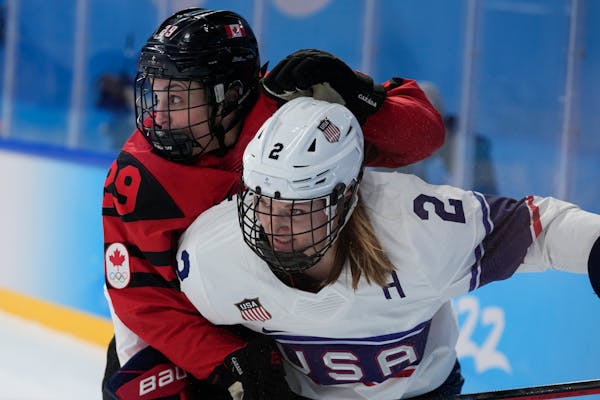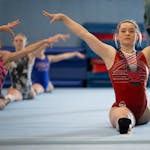 See
more of the story
See
more of the story
BEIJING — There is only one sport that is being played every day of the Olympic Games, and that is curling.
There is only one sport that is being played on all but one day during the Olympic Games, and that is ice hockey.
Which sports at the Olympics had the most Minnesotans? That's right. Curling and ice hockey.
Facts, the kids like to say.
Rachel Blount, my Olympics coverage partner, and I knew this part of the schedule was going to be potentially rewarding for our local athletes in Beijing as the medal rounds approached.
So Thursday (Wednesday in the Twin Cities) required our presence all over town.
The three most important events: Team Shuster trying to survive in men's curling; the U.S. women's hockey team playing against Canada for a gold medal; then Shuster's rink playing in the medal round (provided it won in the morning). For someone covering an Olympics for the first time, the potential to chronicle someone's path to one of sports' greatest achievements would be an everlasting memory.
So the day began at the National Aquatics Center for curling. It's the same place swimmer Michael Phelps won eight gold medals in the 2008 Games, but has marvelously been converted.
Until this point, I had not seen a USA Curling team win in person here. I watched the mixed doubles team lose. I was there for two losses for the women's team — including the loss to Japan that kept Team Peterson from reaching the semifinals — and losses to Sweden, Canada and lowly Italy by Shuster. Minnesota's curlers were 0-6 in my presence.
"Congratulations on destroying USA Curling single-handedly," was one message I received at work.
I don't believe in jinxes. I've met John Shuster and his merry men before the 2014 and 2018 Games — just by-chance encounters at certain establishments — and have learned about curling from them.
On Wednesday morning, they were shot-making savants. Duluth's Chris Plys dominated. Matt Hamilton sang songs between throws. Denmark made a couple of big mistakes, and Team USA moved into the semis. So much for me being a jinx.
There was no time to wait for two buses to get to the Wukesong Sports Center for USA-Canada women's hockey, because the game started while I filed the curling story. I hopped in a cab and reached the arena midway through the game.
Canada had buried everyone at the Olympics, except the USA. But I arrived at Wukesong just in time to see Canada take a 3-0 lead. My greatest concern became true: The USA's habit of starting slow and not burying chances throughout the tournament was going to catch up with Joel Johnson's team.
Hilary Knight's shorthanded goal before the end of the second period was massive. Then, predictably, Team USA came out breathing fire in the third and dominated play. But the Canadian defense was stouter that I thought and held Team USA until a 6-on-4 goal with seconds to play gave them a 3-2 victory and the gold medal.
It was a nice run that fell short. And it wasn't an easy run. The Americans endured a COVID outbreak in December. We found out Wednesday that goaltender Alex Cavallini had a torn MCL in mid-January and was not 100% until the medal round. Key forward Brianna Decker was on the wrong end of a dirty play in the opener against Finland and suffered a broken ankle. She was missed, especially in the faceoff circle, where Canada dominated Wednesday.
I finished my second story of the day, then headed back to the aquatics center. Shuster now faced Great Britain in the semis, and the strategy was fascinating.
Great Britain led 5-4 in the middle of the match. Shuster hunted for multiple points. When that was impossible, he blanked ends, which allowed him to keep the hammer. He kept it in the sixth, seventh, eighth and ninth.
In the ninth, the Brits stole one to make it 6-4. I was baffled but, guess what, there are analytics in curling. It's better to have the hammer while trailing than being tied without it. England, to its credit, made big shots in the second half of the match, played good defense and knocked off Team Shuster.
After leaving the hotel at 8 a.m. Beijing time, I returned at 12:25 a.m. What a day.
Excuse me while I end this here. There's a bronze medal curling match to cover in a couple of hours.






